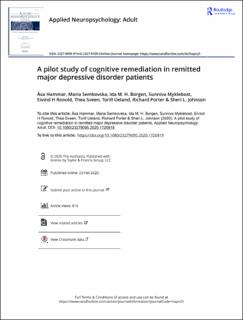| dc.contributor.author | Hammar, Åsa | |
| dc.contributor.author | Semkovska, Maria | |
| dc.contributor.author | Borgen, Ida Maria Henriksen | |
| dc.contributor.author | Myklebost, Sunniva Brurok | |
| dc.contributor.author | Ronold, Eivind Haga | |
| dc.contributor.author | Sveen, Thea | |
| dc.contributor.author | Ueland, Torill | |
| dc.contributor.author | Porter, Richard | |
| dc.contributor.author | Johnson, Sheri L | |
| dc.date.accessioned | 2021-05-03T10:40:35Z | |
| dc.date.available | 2021-05-03T10:40:35Z | |
| dc.date.created | 2021-01-31T18:24:11Z | |
| dc.date.issued | 2020 | |
| dc.Published | Applied neuropsychology: Adult. 2020, 1-11. | |
| dc.identifier.issn | 2327-9095 | |
| dc.identifier.uri | https://hdl.handle.net/11250/2753211 | |
| dc.description.abstract | Major depressive disorder (MDD) is associated with working memory (WM) impairments. These deficits often persist following remission and are associated with rumination, a recognized risk factor for depression relapse. The efficacy of WM-targeted cognitive remediation as a potential relapse prevention tool has not been investigated. The present pilot study aimed to investigate the feasibility, acceptability, and cognitive benefits of a WM-targeted cognitive remediation program in remitted depression. Twenty-eight MDD participants in remission were recruited. The intervention consisted of twenty-five 30–40-minute training sessions, coupled with weekly coaching, administered over a 5-week period. Before and after the intervention, a battery of objective neuropsychological tests and self-report measures was administered. Key outcomes were WM, inhibition and rumination. Acceptability of the intervention was observed, with 83% showing high motivation, along with WM gains for all completers (n = 18, 64% of recruited participants). The cognitive remediation selectively improved targeted WM functions, as measured by objective tests. This did not translate into self-reported improvements in everyday WM or inhibition. However, all but one completer achieved at least one personal goal related to WM and 44% achieved two or, the maximum possible, three such goals. For remitters whose WM was significantly enhanced after the intervention, the cognitive remediation also decreased dysphoric-mood related rumination. The successful pilot testing of the WM-targeted intervention supports the conduct of a fully powered randomized controlled trial as a relapse prevention approach in remitted MDD. | en_US |
| dc.language.iso | eng | en_US |
| dc.publisher | Routledge | en_US |
| dc.rights | Navngivelse-Ikkekommersiell 4.0 Internasjonal | * |
| dc.rights.uri | http://creativecommons.org/licenses/by-nc/4.0/deed.no | * |
| dc.title | A pilot study of cognitive remediation in remitted major depressive disorder patients | en_US |
| dc.type | Journal article | en_US |
| dc.type | Peer reviewed | en_US |
| dc.description.version | publishedVersion | en_US |
| dc.rights.holder | Copyright 2020 The Author(s). | en_US |
| cristin.ispublished | true | |
| cristin.fulltext | original | |
| cristin.qualitycode | 1 | |
| dc.identifier.doi | https://doi.org/10.1080/23279095.2020.1726919 | |
| dc.identifier.cristin | 1884058 | |
| dc.source.journal | Applied Neuropsychology: Adult | en_US |
| dc.identifier.citation | Applied Neuropsychology: Adult, 2020. | en_US |

